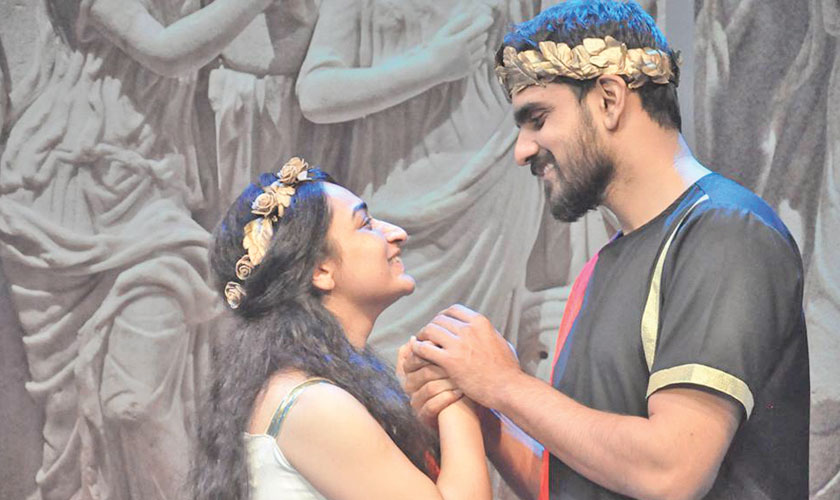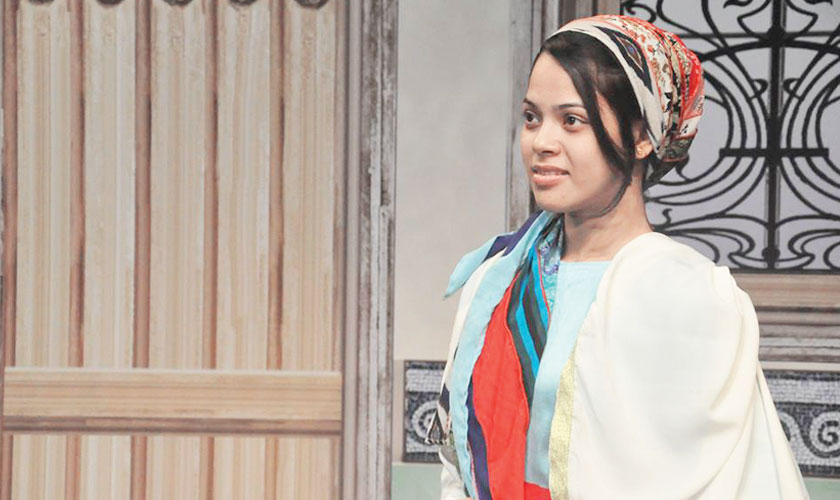When you’re buying tickets to any National Academy of Performing Arts play, you already know that whatever unfolds on stage will be fluent and highbrow. NAPA prides itself on upholding traditions of classical theatre and translating them into new genres and experiments via its many accomplished alumni. As a fan of theatre, you may love or hate NAPA’s approach, but you can never dismiss it. This spring’s first grand production,
Yahudi Ki Ladki is Khaled Ahmad’s homage to both Agha Hashr, the subcontinent’s answer to Shakespeare, and Parsi theatre, of which this play is a classic example.
InstepREport
The director’s take on Agha Hashr’s melodrama and Parsi theatre tradition falls spectacularly, then rises magnificently.
Karachi: When you’re buying tickets to any National Academy of Performing Arts play, you already know that whatever unfolds on stage will be fluent and highbrow. NAPA prides itself on upholding traditions of classical theatre and translating them into new genres and experiments via its many accomplished alumni. As a fan of theatre, you may love or hate NAPA’s approach, but you can never dismiss it. This spring’s first grand production, Yahudi Ki Ladki, is also a grand example of the effect NAPA has on its audience.
Firstly, it is Khaled Ahmad’s homage to both Agha Hashr, the subcontinent’s answer to Shakespeare, and Parsi theatre, of which this play is a classic example. The dialogue flows poetically, and song and music interject to strengthen the emotion of the moment. This should be a powerful moment on stage, but in Yahudi Ki Ladki, it leaves one squirming in the seat, waiting for the show to get on with it.

The dialogue flows poetically, song & music interject to strengthen the emotion of the moment.
This is not because the dialogue is weak; it is actually beautiful, rhythmic prose, and in the first few minutes of the play, serves as a platform for how far Fawad Khan has come as an actor. He is strong in presence and delivery, and energetically overshadows both Kaif Ghaznavi and Maria Saad Fareedi, as Desiya, the lovelorn fiancée of his character Markas, and Raheel, his true love.
It is not because the story isn’t compelling, because it is, and as many will note, resonates with the times of racial, ethnic, and sectarian divisiveness we live in. It isn’t because the music is bad or jarring. No, there is nothing wrong with the various cogs and chains that make up Yahudi Ki Ladki. It is the sum of these parts that is dissatisfying.
The pockets of comic relief in between acts are fun, and quite obviously a hit with the audience. Farhan Alam and Hammad Khan as Sher Khan and Bakhshu are on the money, and Zarqa Naz’s Fitna is crisp and funny. And while we get that this is the Parsi theatre format, what it does in this particular incarnation of Yahudi Ki Ladki is take away from the momentum that cooks slowly as the story progresses before it explodes into a scream of emotion and drama. To put it in contemporary terms, the final acts of Yahudi Ki Ladki wil make you feel all the feels - the first few may compel you to leave.

The second half of the play belongs to Akbar Islam’s Brutus and Nazrul Hassan’s Ezra. Both actors who have proven their excellence time and again, Islam and Hassan can move you to tears as the story approaches its explosive conclusion, and somehow, make you forget the absolute irritation brought on by the first half of the play.
Though as the audience, we are happy that there are actors like Akbar Islam and Nazrul Hassan on the Pakistani stage, as always, the female cast of Yahudi Ki Ladki is somehow less polished. Why that remains a NAPA-specific problem even now is baffling, though the inclusion of newer faces such as that of Hani Taha’s – who is both part of the chorus and the comic act – gives hope for a more diverse future as far as women in Pakistani theatre go.
Conclusion? If you can sit through 55 minutes of abruptness and banality, Yahudi Ki Ladki will reward you with 60 minutes of fiery drama.